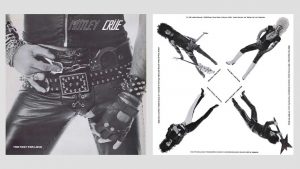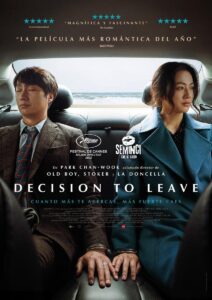
At present, there is no need for a lengthy introduction to Park Chan-wook, one of the most prominent directors in modern cinema. With refined plots, breathtaking cinematography and provocative scenes, his films took the international audiences by storm in the past two decades. Oldboy, Lady Vengeance, and The Handmaiden are among the films that cemented his status as an innovative storyteller and an excellent director.
Park’s newest release, Decision to Leave, stands out from the rest as the director departs from his usual thriller genre to deliver a heart-rendering romance. The film–with an age rating of 15–does not include graphic scenes of violence and sex, which has become a bit of a trademark for Park’s work. Decision to Leave is a slow burn romance and mystery that leaves the viewers just as shattered as the main character by the end.
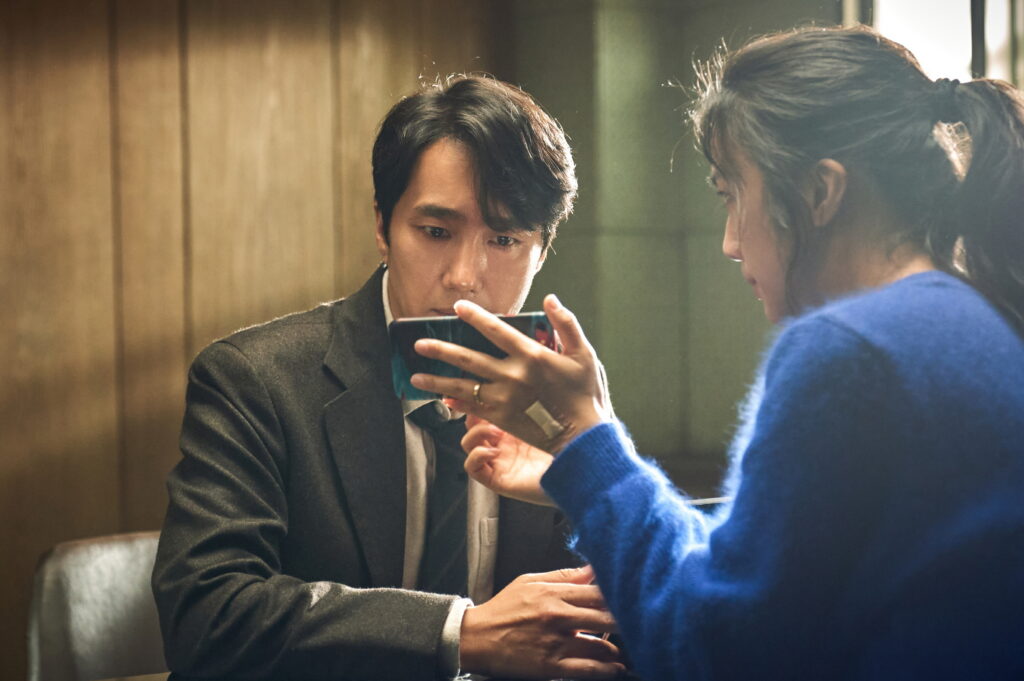
The film follows Park Hae-joon (Park Hae-il), a calm, Busan-based detective who finds himself slowly growing feelings for Song Seo-rae, a Chinese immigrant (Tang Wei) and the main suspect in a murder case. As the investigation progresses, the protagonist finds his once orderly life crumble into pieces as he navigates the stormy waters of a love that can never be, while simultaneously trying to save his career. Right from the start, the murder investigation is pushed to the background and the slow-burn romance starts to unravel. Throughout the next two and a half hours, the film slowly but surely builds up to its dramatic ending. Even though Decision to Leave does not lack the usual twists provided by Park Chan-wook in the rest of his films, the reveals here are more saddening than shocking.
Note: The rest of this review contains spoilers for the film
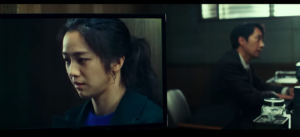
The romance between Hae-joon and Seo-rae blooms through the murder investigation. Every part of it plays a role in the development of their secret love; every duty performed by the detective is filled with secret yearning. Their first “dates” are held in the poorly lit interrogation room; they get to know each other through personal questions asked over expensive sushi. Hae-joon’s task of following Seo-rae soon turns into a game between two lovers, pictures he takes of her become precious mementos. The love story resulting from this unusual setting is deeply moving. At the end of the film, the souls of the two characters seem intertwined, as if their existence were dependent on one another. In the few happy moments they have together, Seo-rae and Hae-joon fall in together perfectly, even though their lives could not have been different.
The most important point of the film is what pushes two people from completely different backgrounds into playing this dangerous, destructive game. What makes them want to engage in a relationship doomed from the start?
Here, Park Chan-wook offers an in-depth commentary on social status and the pressures that come with it. Both characters seek refuge from their lives, even though for completely different reasons. Seo-rae is an immigrant with a difficult past. She is not a typical femme fatale, arriving in the protagonist’s life to destroy it. She is a caretaker for the elderly, beloved by her patients, but not respected by the wider society. The language barrier makes it difficult for her to fully show her wit and personality. Seo-rae seems to have long accepted that her life will never amount to anything; she will always live in the shadows, and never as a “respectable” person in the eyes of the society. These feelings, combined with her dark secrets, make her yearn to be seen and understood by another person.
At first glance, Hae-joon seems like the absolute opposite of Seo-rae. He is a respectable police officer, going through life with strong moral values and discipline. His long-lasting marriage seems perfect and he even successfully quits smoking. However, he suffers from insomnia and goes through life in a passive, unfulfilled manner. Just like Seo-rae, the detective feels trapped in his life. The only difference between the two is that Hae-joon does not seem to realise how unhappy he is. He only subconsciously longs for danger and chaos that would break him out of his unhappy marriage and boring, sleepless life. In contrast, Sae-rae embraces the chaos, consciously leaning into the darkness.
Both characters are defined by their social status and struggle equally because of it. In their twisted love, the insomniac detective and the haunted immigrant find a temporary escape from their suffering. Park Chan-wook paints their doomed romance as a way to free themselves from the unhappiness of their lives. The two characters find refuge in each other, even if only momentarily, much like in the scene of them hiding from rain in a temple.

In addition, the story provides a commentary on the modern person’s illusion that they have control over their life. Hae-joon’s marriage is based on statistics; he and his wife believe that acting according to the data will guarantee a successful relationship. The investigation he conducts relies on smartphones as key evidence. Messages recorded on phones and smartwatches play a key role in the relationship between Seo-rae and Hae-joon; the pair also uses translator apps to understand each other better. However, the omnipresent technology and order cannot account for human ambiguity. In one of the scenes, Seo-rae says to the cat “bring me the inspector’s heart, ” but the app translates it into “bring me the inspector’s head”, leading to a misunderstanding between the lovers. Park Chan-wook shows that the order provided by technology, science, and logical thinking crumbles in the face of the unpredictable human nature.

Portraying the slowly blooming romance could not have been an easy task for the main cast, as both characters are used to restraining and hiding their real feelings. Their words rarely overlap with their thoughts; their real meaning is hidden in small gestures, looks, and facial expressions. Most of the film’s plot relies on these nuances. The intimacy between Seo-rae and Hae-joon is shown through the smallest gestures like cleaning the table together or cooking next to each other. In every scene together, the actors delivered breathtaking, emotional performances sizzling with subdued chemistry.
Known for more of a stoic style of acting, Park Hae-il steps outside of his usual range at the end of the film, giving one of the most moving performances of recent years. Even with the extreme long shot, the agony and fear felt by his character translate perfectly through the actor’s posture. All throughout the film, Park Hae-il perfectly captures the feelings of a man slowly losing control over his life, swept by conflicting emotions and paralysed by his own passiveness.
Tang Wei’s performance is absolutely the stand out of the movie. She brings undeniable magnetism to the screen, making it easy for the viewers to understand why Hae-joon is so intrigued by Seo-rae. Tang Wei’s expressive facial expressions make up for the character’s limited language skills. She is mysterious and dynamic at the same time, her performance bringing enormous depth to the character.
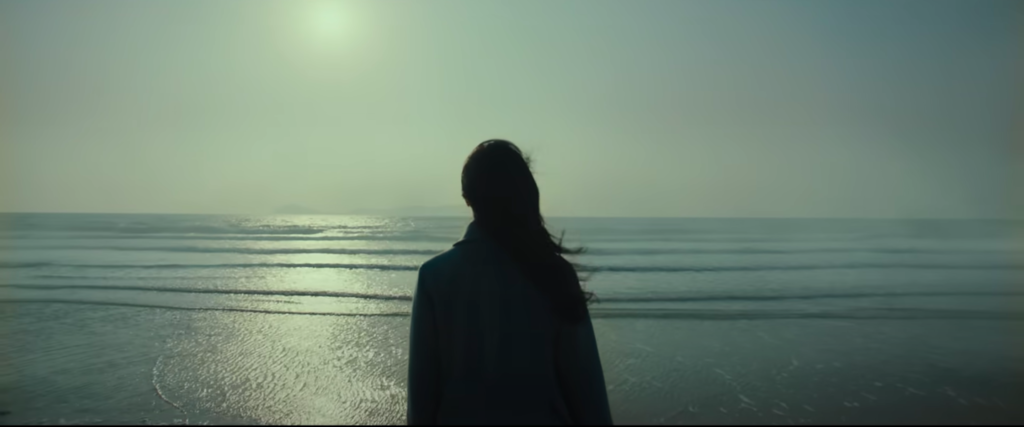
There aren’t enough words in the English language to praise the incredible cinematography of Decision to Leave. The movie is filled with awe-inspiring shots of nature, whether it be the wild sea or the stoic mountains. One could spent hours just watching the film’s beautiful shots of the sea. Of course, the classic Park Chan-wook dramatic zoom-ins could not be missed in this film. The cinematography is a perfect balance of static and dynamic camera work.
The film also features intricate editing that elevates the story, keeping it interesting despite the long runtime and slow pace. Scenes are linked through songs, X-ray images, or TV screens. While one character is texting, we see the perspective from within the phone screen, as if they were looking at the reaction of the person they are texting. The editing is ever changing, but not obnoxiously so, keeping the film interesting without being too flashy.
The music by Jo Yeong-wook, and the inclusion of Mahler’s monumental Symphony No. 5, further elevates the viewing experience. The characters’ convoluted emotions are reflected in the hypnotising soundtrack. Chaotic, frightening, and touching by turns, there could not have been a better choice of music to express the stakes of the film’s main relationship,
With a complicated, nuanced plot, Decision to Leave is best watched more than once. It is definitely a satisfying watch, with every detail of the story worked out to perfection. With its age rating and elements of humour, it feels easier to digest than some of Park Chan-wook’s other works, but still leaves a deep impression. In a Q&A session with Bong Joon-ho shown after the screening in selected cinemas, Park Chan-wook shared that he wanted the film to feel like a classic. He definitely achieved that effect with the exquisite slow-burn noir romance that is Decision to Leave.




